Café Corner Bookshelf
Dev Studies Café FAQ
The Dev Studies Café is a monthly online session led by Dr. Catherine-Laura Dunnington, where students connect and discuss a variety of topics. Each session begins with a picture book reading.
It takes place on the first Saturday of every month via Zoom from 9:00 am to 10:00 am.
All Developmental Studies students are welcome to attend. Zoom details are shared in the monthly newsletter: student-newsletter
Welcome to the Café Corner Bookshelf where you will find all the picture books featured in our monthly Dev Studies Café.
January 2026
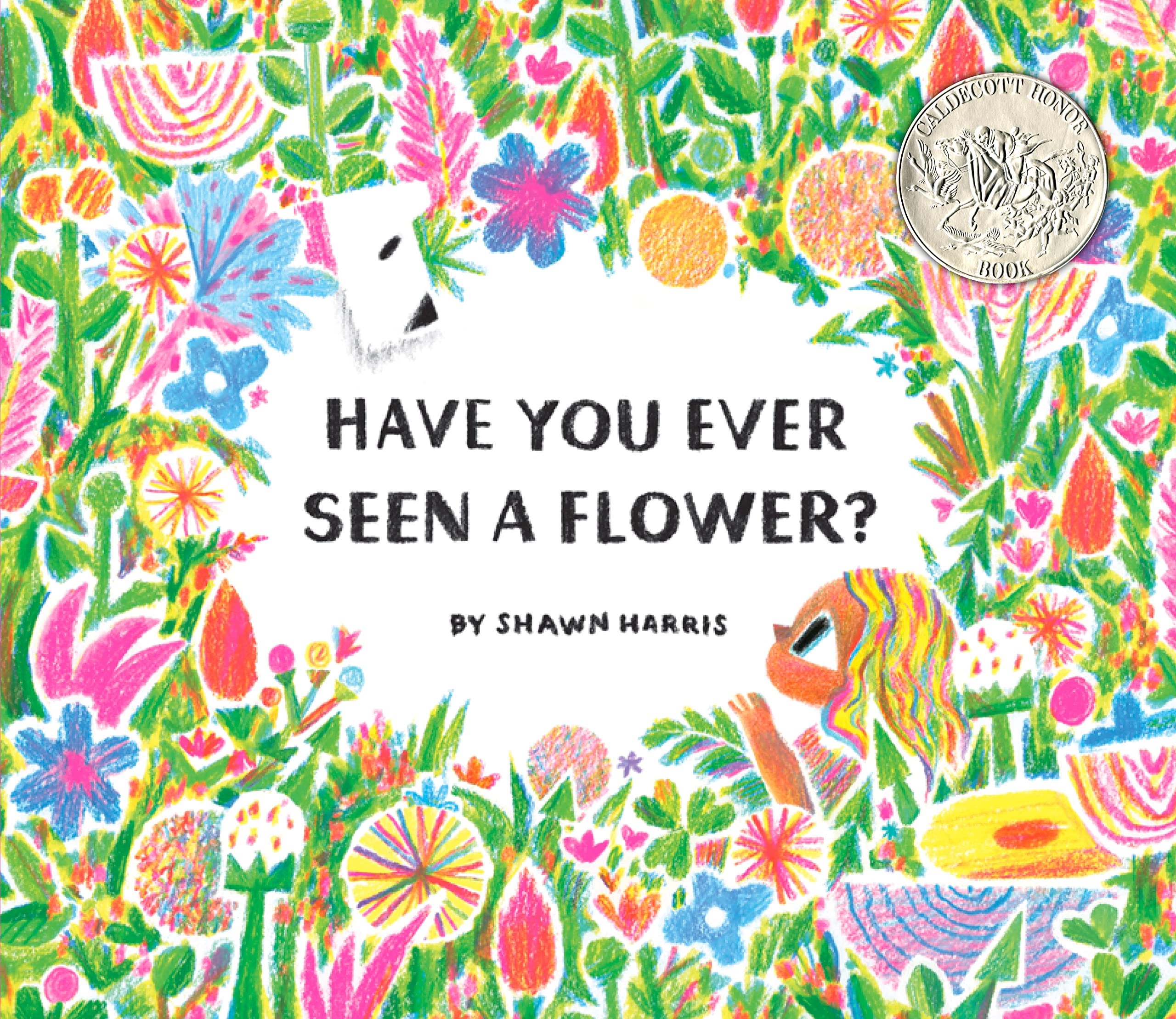
Book: Have You Ever Seen a Flower?
Author & Illustrator: Shawn Harris
Year: 2021
Publisher: Chronicle Books
Perhaps I was lustily wishing for Spring when I picked this book, but I recently read Have You Ever Seen a Flower? and I think you should too. The colored pencil illustrations are so tactile, so saturated, you can’t help but linger over them. If we add to this visual treat the way that Harris invites us to think-with flowers from our belly button outward, we have a picture book most early childhood spaces should add to their shelves right away.
Life is inside you.
Life is all around you.
Now put your hands on your belly and say, “This is my stem.”
When you read those lines aloud to children, you’ll be offered the perfect moment to recentre alongside them… put your hands on your belly. This book is deceptively simple. It is lush and yummy. It sidesteps the bunny-bunny books that saturate our Spring read-alouds and lands squarely in the flower fields where dandelions grow too. In the words of the inimitable Eeyore “weeds are flowers too, once you get to know them”. I have always agreed with Eeyore on this, and I feel that Harris’s book give us a nice firm handshake with any flower. You’ll leave this book knowing them anew.
Until Next Month,
Catherine
December 2025
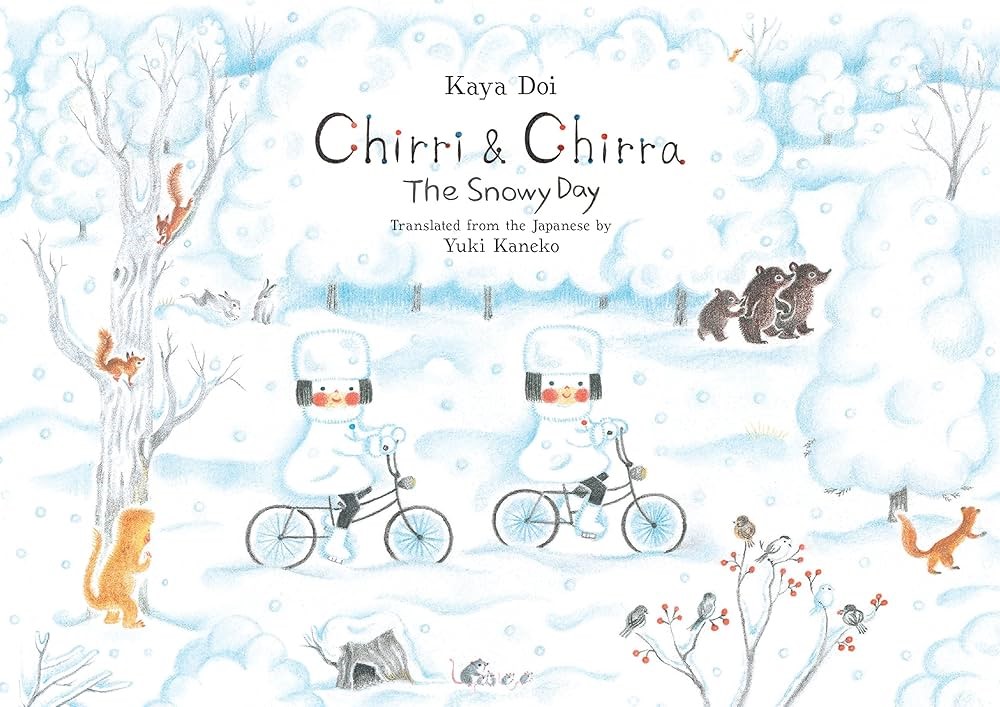
Book: Chirri & Chirra: The Snowy Day
Author & Illustrator: Kaya Doi
Translated from the Japanese by: Yuki Kaneko
Year: 2017
Publisher: Enchanted Lion Books
Albert Einstein was once asked by a young mother how to support her child’s intelligence and he replied “read fairy tales”. The mother asked him what to do after that, and he replied, “read more fairy tales”. Perhaps what has made fairy tales so hard to come by in today’s classrooms is that we feel removed from the world they used to belong too. I often lament this, as I feel there was much to be considered in artful retellings of The Three Billy Goats Gruff, for example, or Goldilocks and the Three Bears. But, no matter, because Japanese author/illustrator Kaya Doi has created the gentle and relatable fairy tale adventures of two little twin girls Chirri & Chirra, and the many magical adventures they have in the forest near their home. Here is the fairytale I am confident your class needs.
In this particular installment, The Snowy Day, the two bike-loving girls take off down the snowy path and encounter all manner of whimsical forest creatures. They discover hot springs, marbles made of frozen flower buds, warm fruit punch in crystal glasses, and friendship with a bear family. The Chirri & Chirra stories all follow a predictable story pattern, and the soft pencil illustrations invoke wonder from the first page. There are details to pour over in each image, and warm repetition to be found on each adventure. These tales will not disappoint your young learners - they take the pace and storytelling prowress of our youngest children to heart. If you are hesitant about bringing in some fairytales that have fallen out of fashion, then you won’t be disappointed by this series.
Until next month,
Catherine
November 2025
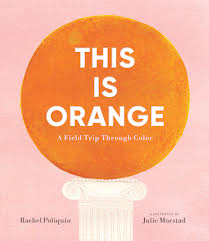
Book: This is Orange
Author & Illustrator: Rachel Poliquin (auth.) and Julie Morstad (ill.)
Year: 2025
Publisher: Candlewick Press
How many times, in how many classrooms, on how many days of the week, does someone ask “what’s your favorite color?”. I would wager that it is incredibly often. I have often wondered about our educative practice of naming and categorizing colors. Undoubtedly, the world showcases her colors to us and naming them can be a great source of joy. Joy only increases with nuance in that color: are they green fields? Or gray green fields? Or… a desiccated gray green fading into pale gold? There is indeed something joyful in naming the colors around us.
Yet, color books persist in being some of my least favorite. On my own bookshelf there are quite few, the notable exception being Red is Best, that classic of preschool color-forward agency (Stinson, 1982). Recently though, I found the newly published jewel This is Orange by Rachel Poliquin (author) and the inimitable Julie Morstad (illustrator). Here is a color book worthy of that joyful designation. We take the lens of orange as a narrative thread through the history and application of where this color has gone, both to-and-from. From the likely first instance of the label orange in English (1502 in a painting of Margaret Tudor’s sleeves), to orange shirt day here in Canada, to the Mullick Ghat flower market of India overflowing with marigolds, we trace orange across time, meaning and gradients. The subtle-yet-luminous style that Morstad is famous for is on bright display. Impossible to imagine that young readers won’t pour over the illustrations, hunting for the oranges on each page.
I hope you bring this book into your classrooms. Each day we interact with, name, and consider color. This book helps us do that my favorite way: on purpose.
Until Next Month,
Catherine
September 2025
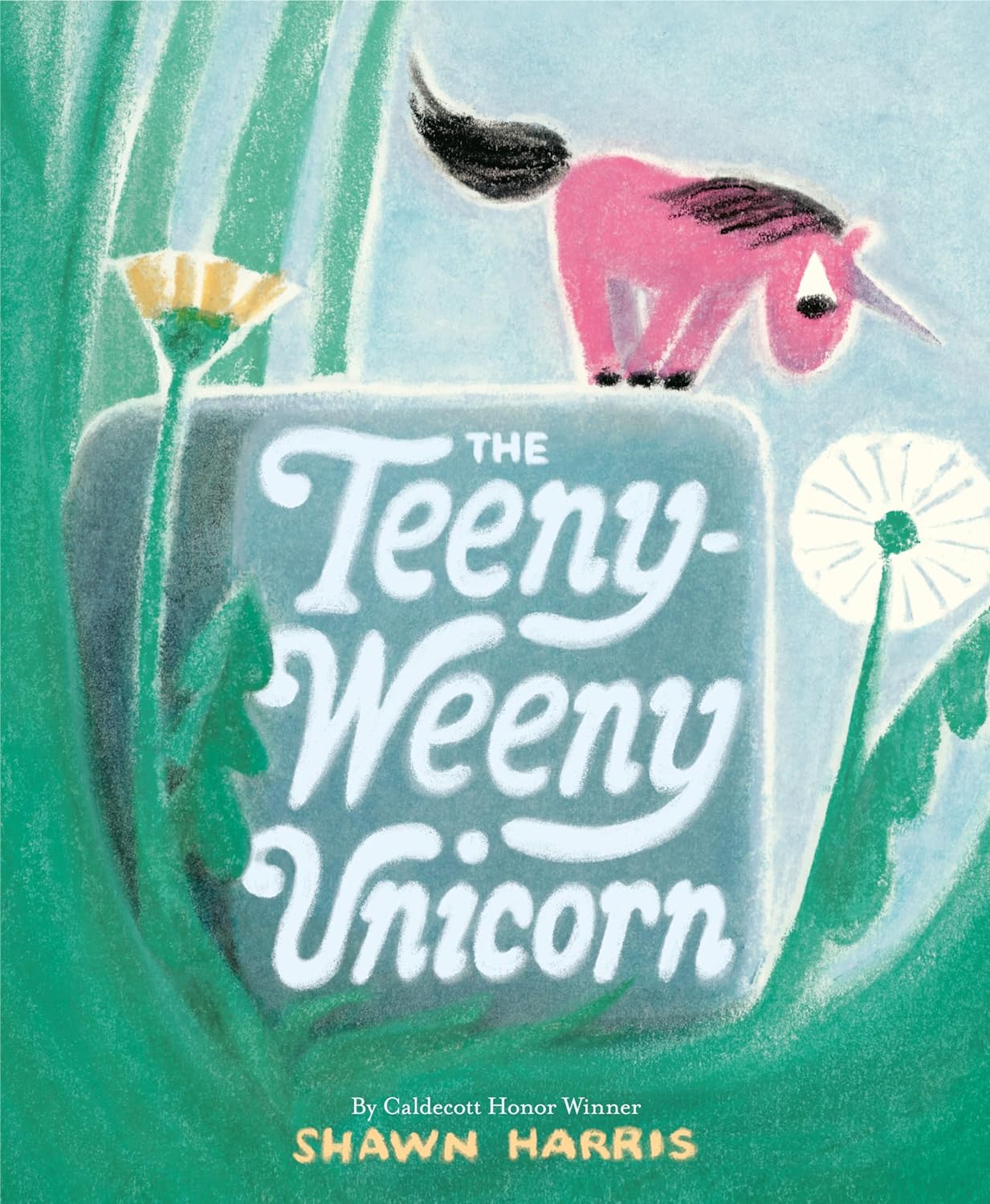
Book: The Teeny-Weeny Unicorn
Author & Illustrator: Shawn Harris
Year: 2024
Publisher: Alfred A. Knopf
Who doesn’t love a unicorn? Sure, I’ve never met one and neither have you but, somehow, I just know. Here is the book your classroom of unicorn-lovers have been waiting for. There isn’t a single overwrought sugar-sweet unicorn in this one, and for that I am ever grateful. In Shawn Harris’ electric book we have a teeny-weeny unicorn who wishes desperately he was the size of a “regular” unicorn, like his irksome brother and sister Prince Butterscotch and Fancy Annie. The neon pink teeny-weeny unicorn is so lovable, so cute, so relatable, he’s nearly impossible to resist. (Worth mentioning that with just a triangle and dot, Harris has drawn one of the most expressive eyes in children’s literature. It’s, indeed, irresistible).
What follows is a teeny-weeny unicorn who has had enough of being teased and overlooked (literally). When he runs off into the palace lawn, and ends up lost, he discovers that size is relative after all. In the spirit of the tough gnome whose car the teeny-weeny unicorn squishes “We are all teeny-weeny. We are all giant. And we are all just the right size”.
If you love this one, I’m happy to report there’s a sequel: The Teeny-Weeny Unicorn’s Great Big Wish (Harris, 2025).
Until next month,
Catherine
August 2025
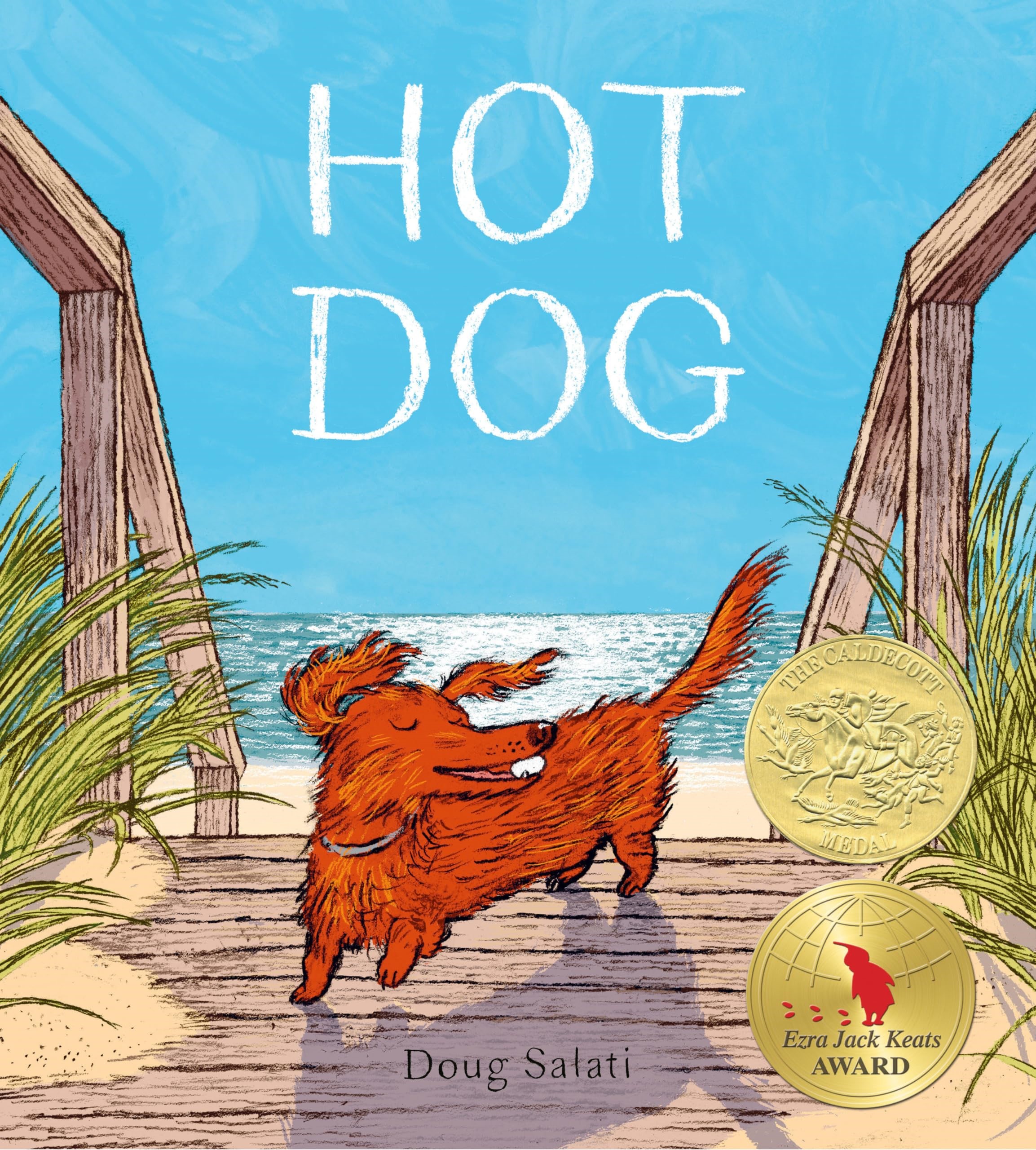
Book: HOT DOG
Author & Illustrator: Doug Salati
Year: 2022
Publisher: Alfred A. Knopf
Originally published in: English
City summer
steamy
sidewalks
concrete
crumbles
sirens
screech
so hot!
can’t sit
or sniff
or wait
In Hot Dog author and illustrator Doug Salati brings us the most empathetic picture book I’ve read in years. Yes, you’ve likely guessed, a hot-dog dog (i.e. Dachshund) is too hot. But from that premise a compassionate companion hears what her dog can’t say. Any child knows a little something about being hot, sticky or frustrated. Any child also knows what it might feel like to be misunderstood by those companions (ahem, adults). But in Hot Dog the adult listens fiercely, and responds fiercely. Whisking that dog off to the beach brought vicarious tears to my eyes.
I urge you not to overlook this deceptively simple picture book, awarded both the Caldecott and the Ezra Jack Keats medal in 2023. The illustrations have zest. While they follow in the tradition of loose lines and secondary colors - done so well! - there is an indisputable energy here that transcends what is on the page itself. This is a delicious book. I predict you will read Hot Dog again and again. Put it on your classroom bookshelf and come let me know.
Until next month,
Catherine
July 2025
Book: They Say Blue
Author: Jillian Tamaki
Illustrator: Jilliam Tamaki
Year: 2018
Publisher: Groundwood Books
Colors. One of the first corresponding concepts we highlight for children. We all perceive colors differently, of course, but nevertheless we persist in nearly quizzing children about their colors. Green goes with Tree, Blue goes with Sky, Yellow goes with Sun. These pairings persist, and contain truth, but certainly anyone who has gazed at a sunset or an Aspen tree in the Fall will know that they are far more than just blue or green.
In Jillian Tamaki’s The Say Blue we finally have the color book we have needed to push our color conversations further. Published in 2018, and now available in board book format too, if you happen to pick up this book you will be met immediately by a spare and lyrical take on how color weaves through our lives as perceived by one small girl. This is a book where color is dealt with in particularities instead of in universals.
They say blue is the color of the sky. Which is true today! They say the sea is blue too. It certainly looks like it from here, but when I hold the water in my hands it’s as clear as glass. (2018)
I had doubts that the board book format made sense for such a complex tale, but I was quite wrong. I have read this to children from birth to seven, and while not every child enjoyed it (except the page about blood!), every age group resonated with a girl thinking-with color in her own life. I hope you’ll give this different and contemplative book a chance.
Until next month,
Catherine
June 2025

Book: A Sleepless Night
Author: Micaela Chirif
Illustrator: Joaquín Camp
Year: 2024
Publisher: Transit Books
Originally published in: Spanish, translated by Jordan Landsman
In centers all over the city, I have been hearing the phrase “no bathroom words, please”. Sure, I can understand that a detailed discussion about bowels while trying to eat snack poses some appetite challenges. But still, I keep wondering about this phrase. Every human I have ever met - young, old, or something in between - uses the bathroom multiple times a day. On top of that, children, from infancy to preschool, have a particularly bathroom-forward relationship with the world. Through the diapers and potty learning alone, it makes so much sense to me that bathroom words would be, well, interesting.
In A Sleepless Night we have an immediately-relatable tale of a baby who cannot be consoled. When little Elisa starts crying one night, she can’t stop. In fact, “she cried so hard you could hear it on the other side of the planet. Fortunately, it was daytime there and everyone was awake” (p. 10-11). Her wall-shaking cries wake the neighbors, who come one by one, bearing outlandish solution after outlandish solution; treasures, sweets, walking, telling secrets, even dressing up like fruit. Nothing works. Just what is the matter with little Elisa anyway?!
Have you guessed it? Poor baby Elisa feels immediately better- and goes right to sleep- when she finally lets out “a colossal fart”. The illustrations (Camp) in this book are rendered in inky marker and reminiscent of saturated notebook paper. It is hard to imagine children will not delight in this tale of insomnia, chaos, family and flatulence. In Chirif’s A Sleepless Night, I have found a book I hope educators will use to consider a different way to live with bathroom words in their classrooms. After all, the bathroom words can be silenced, but colossal farts cannot.
Until next month,
Catherine
May 2025
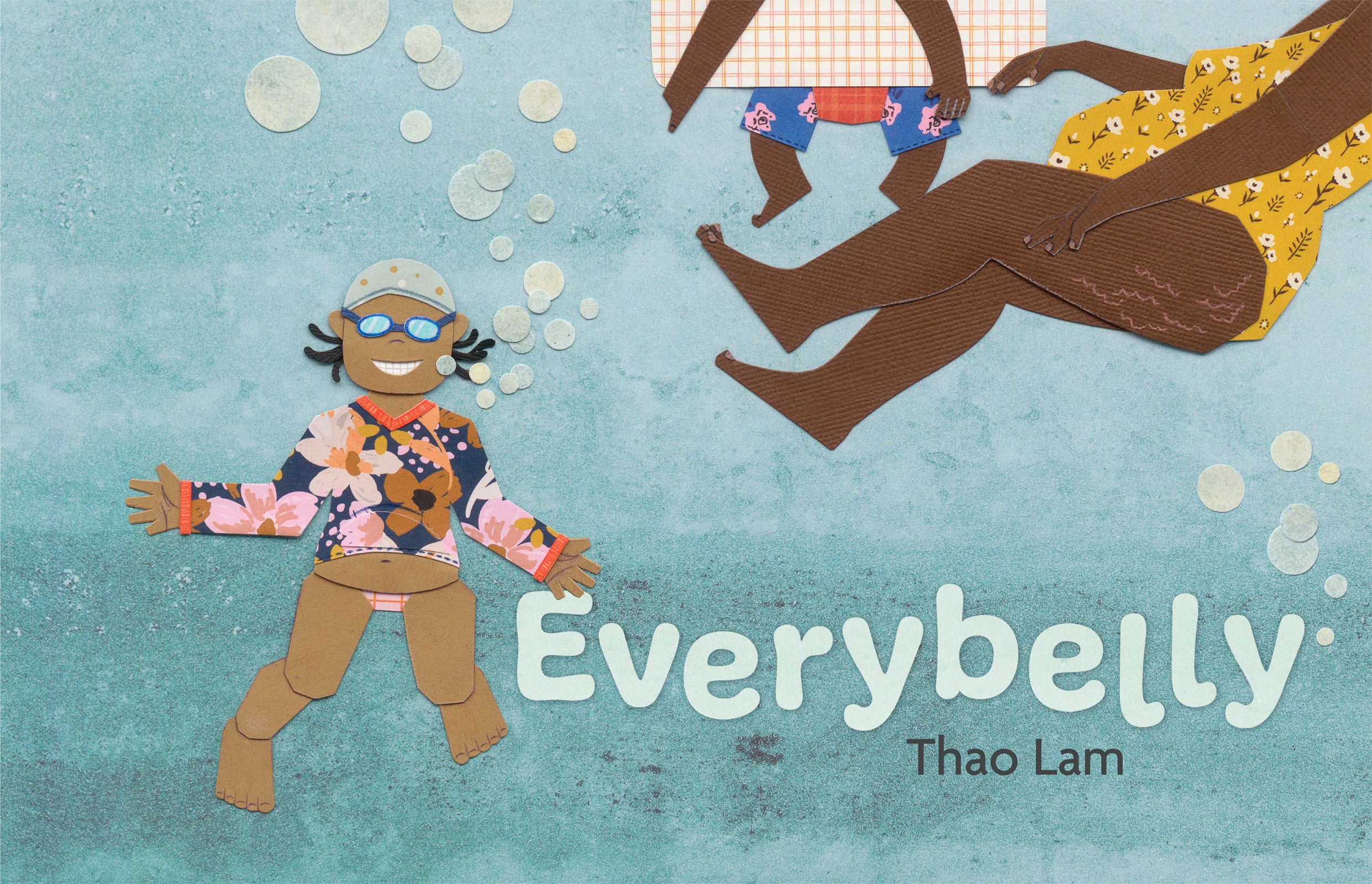
Book: Everybelly
Author & Illustrator: Thao Lam
Year: 2025
Publisher: Groundwood Books / House of Anansi Press
Originally published in: English
Bodies. We all have one. No matter if it is tall, brown, tanned, bald, thick, big, able, one-footed, near sighted, wrinkly… bodies of some sort are a universal. If you are here, you have one. If you work with children, in any capacity, chances are you talk about bodies daily. I hear phrases such as “is your body hungry?” or “if your body tired?” in many classrooms, and I think a picture book that brings us to the body without being didactic or moralizing is something we should all consider including on our classroom bookshelves.
In Everybelly author and illustrator Thao Lam gives us Maddie, a young protagonist rendered in colorful cut paper collage, headed to the pool and narrating every belly she sees. We get bellies in all their guises, but the words of the book themself are Maddie’s narration of her neighbors and their notable characteristics. The book delightfully takes Maddie’s point of view - narrating from the line of sight right around the belly. Visually and in text the book offers us many points of conversation and consideration as we wonder aloud about bellies with the children in our care.
When my belly is full, it’s nice and round. But an empty belly goes flat.
Mama works hard to keep our bellies full.
[…]
If I had room in my belly, I would fill it with ice cream topped with jelly beans, donuts dipped in sprinkles, har gow, gimbap, mochi, mangosteen, onigiri, croissants, bubble tea […]
Until next month,
Catherine
April 2025
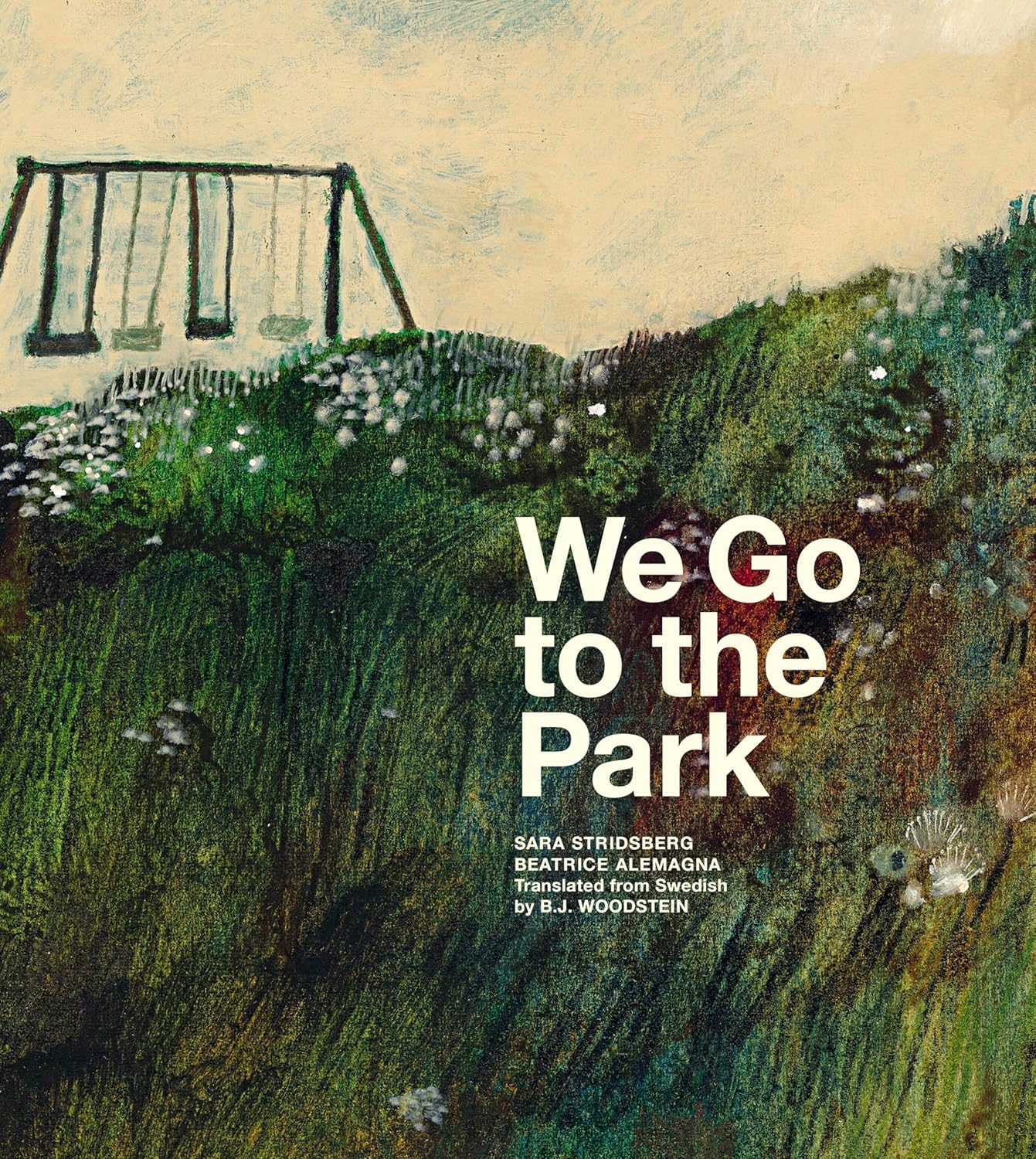
Book: We Go to the Park
Author: Sara Stridsberg
Illustrator: Beatrice Alemagna
Year: 2021 (original) 2024 (translation)
Publisher: Enchanted Lion Press (under Unruly Books)
Originally published in: Swedish, translated by B.J. Woodstein
Some spaces, regardless of language, design or culture, immediately harken to children. A park is one of these. They are old, new, metal, colored, safe, scary, rickety, sparse, overgrown… the list of adjectives to describe these spaces is long. A humble patch of grass with a long see-saw is a park. So is an elaborate technicolored climbing structure with rubber substrate underneath. A park is a powerful symbol worth interrogating.
In We Go to the Park, Stridsberg (author) and Alegmana (illustrator) have created an exquisite ode, neither sentimental nor sweet, to the park. They celebrate and trace the park as a rich site in which childhood enacts and confronts other systems. This picturebook is printed by a unique imprint (Unruly) which prints picture books that defy age categories and conventions. The artwork is recognizable but contains something of the absurd. By playing with proportions and textures the images bring us into the uncomfortable spaces of childhood. Overwhelmingly we are left wondering what is it about parks that make them such hosts of possibility.
Read this one to your adult self and see how it might influence your observations and thoughts about children’s outdoor spaces. Wonder alongside these authors as “we let it take us where it will”, when We [all] Go to the Park.
Until next month,
Catherine
March 2025
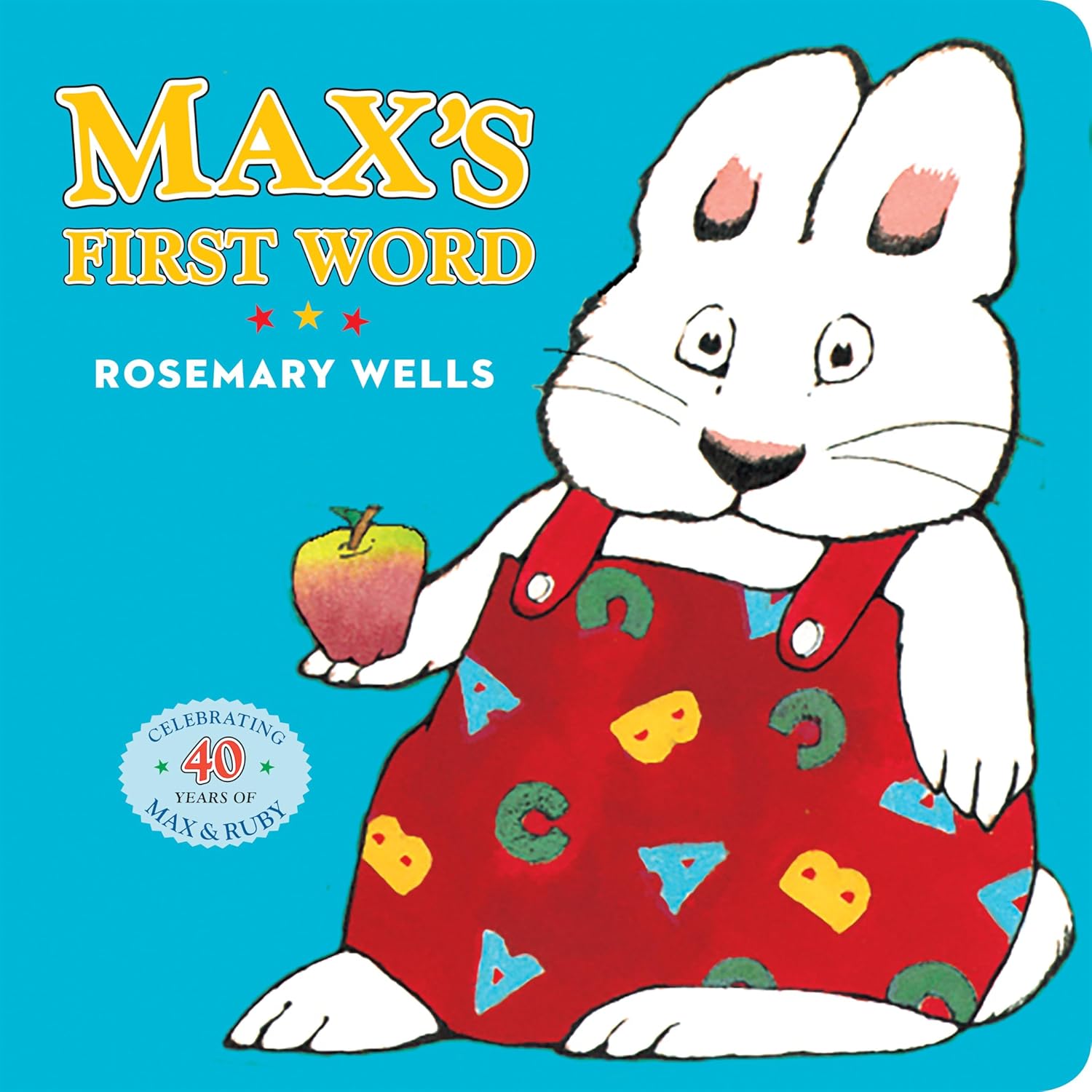
Book: Max’s First Word
Author: Rosemary Wells
Illustrator: Rosemary Wells
Year: 1979
Publisher: Viking Books for Young Readers
Max is a well-known young bunny, who might have already appeared in many classrooms across Winnipeg. He has a television show, he is a stuffed animal sometimes, he has many titles to his name… but in this classic of Well’s oeuvre, we get Max at his absolute best. When Viking Books reprinted the 40th anniversary edition of this classic, bringing it back into print for today’s readers, I knew I had to bring it to the attention of our Developmental Studies Café team.
“Max’s one word was “BANG!”, starts this classic, and from there Max’s bossy sister Ruby tries everything to get this toddler brother to say anything else (cup, egg, fish, broom…). In Well’s inimitable style we see the chubby and defiant Max holding his verbal ground. To every prompt he replies simply and confidently: “Bang!”. The final twist, when Max responds to a bite of a crunchy apple, will be so satisfying to every child who has ever felt ignored or pushed toward learning on someone else’s schedule. This is an absolute gem of a board book, perfect for educators of young children who champion their unique and inventive ways of growing into themselves.
Until next month,
Catherine
February 2025
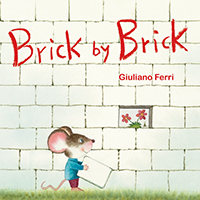
Book: Brick by Brick
Author: Giuliano Ferri
Illustrator: Giuliano Ferri
Year: 2016
Publisher: Red Leaf Press (North America)
Here is the wordless board book that everyone needs. A young mouse, beautifully rendered in soft color and stroke, approaches a large wall where a brick has come loose. In this extended metaphor for finding connection, joy or peace, Ferri brings readers of all ages (birth to adult) into a mouse’s adventure dismantling walls to build bridges.
Do not let the simplicity of the premise fool you. This is a work that will crack open your heart. Ferri has hit on a timeless and timely topic; he has made it immediately recognizable to all who seek to build instead of destroy. Whether your conversations with this text center on the animals it portrays or your own community, I urge you to bring this book into your classroom. If you want to borrow a copy from me, I bought 5!
Until next month,
Catherine
January 2025
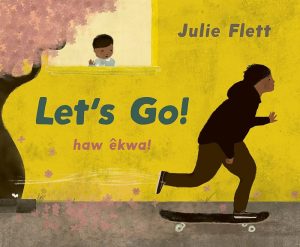
Book: Let’s go! haw êkwa
Author: Julie Flett
Illustrator: Julie Flett
Year: 2024
Publisher: Greystone Books
I must nod vigorously toward Julie Flett. Flett, brought us Birdsong and Wildberries (2019; 2013), has created this new work, Let’s go! haw êkwa, and it pains me with its beauty. Here is the story of young boy watching lustfully as the skateboarders pass his window. One day his mother surprises him with a skateboard from her childhood (she skateboarded too?!). This sparks the beginning of trial, error and, ultimately, community. In the final pages Flett describes what led her to creating this book. Watching her son and his friends experience a “creative urgency”, an “I have to go” feeling, that skateboarding physically manifested for them, give rise to this incredible text (n.p., 2024).
While books that feature the past experiences of First Nations Peoples are important, I would also encourage us to consider those that give us the visceral experiences of happening-today/playing-today/right-here-right-now First Nations children. Bring this book into your classroom; it is a flashlight.
Until next month,
Catherine
Respectfully adapted from Picture Books to Grow, with the author’s permission, (October, 11, 2024)
